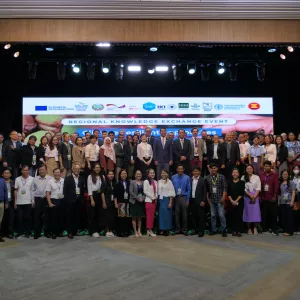ASEAN validates priority actions for net-zero agriculture
Southeast Asian nations are taking a significant step towards achieving net-zero emissions in agriculture. In a recent workshop in Phnom Penh, Cambodia, the Association of Southeast Asian Nations Climate Resilience Network (ASEAN-CRN) has validated seven key actions derived from the newly launched ASEAN Carbon Neutrality Guidelines for Agriculture. This collaboration with the European Union (EU) through the Enhanced Regional EU-ASEAN

ASEAN validates priority actions for net-zero agriculture
Southeast Asian nations are taking a significant step towards achieving net-zero emissions in agriculture. In a recent workshop in Phnom Penh, Cambodia, the Association of Southeast Asian Nations Climate Resilience Network (ASEAN-CRN) has validated seven key actions derived from the newly launched ASEAN Carbon Neutrality Guidelines for Agriculture.
This collaboration with the European Union (EU) through the Enhanced Regional EU-ASEAN Dialogue Instrument (E-READI) acknowledges the crucial role of agriculture in both causing and combating climate change.
The validated actions focus on various areas critical for a sustainable future, including:
- Adopting low-carbon practices and technologies.
- Promoting dietary shifts towards more sustainable consumption habits.
- Implementing carbon pricing schemes to incentivize low-carbon practices.
- Enhancing carbon sequestration through improved land management.
- Reducing food waste and other forms of agricultural loss.
- Increasing ambition for climate action within ASEAN.
- Supporting farmers’ livelihoods and resilience in the face of climate change.

Over 100 representatives from ASEAN governments, agricultural experts, and industry players participated in a regional knowledge-sharing event to refine these actions. Discussions focused on practical implementation strategies and scaling up innovative approaches for climate-smart production and marketing.
This effort signifies a strong commitment by ASEAN member states to a sustainable and climate-resilient agricultural future.
The validation workshop was part of the ASEAN CRN Regional Knowledge Exchange Event organised by GIZ Cambodia. The overall event was a collaboration between E-READI, the GIZ project Strengthening Climate Resilience in Agricultural Systems (CRAS), the ASEAN Secretariat, the ASEAN CRN, the Foundation of Netherlands Volunteers/Stichting Nederlandse Vrijwilligers (SNV Vietnam), FAO, and other partners, including CGIAR and the International Rice Research Institute.
This activity is part of the CGIAR Initiatives on Asian Mega-Deltas and Low-Emission Food Systems.

